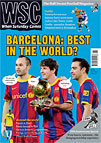 A change in the Arsenal boardroom does not necessarily dictate a change in the club’s direction. Jon Spurling tells all
A change in the Arsenal boardroom does not necessarily dictate a change in the club’s direction. Jon Spurling tells all
Last month, Stan Kroenke added Arsenal FC to his extensive portfolio of sports clubs. As usual, “Silent Stan” avoided saying anything of consequence to the media about the development, while in marked contrast to the noise surrounding the “Russian Revolution” at Chelsea in 2003, or John W Henry’s takeover at Liverpool earlier this year, the announcement that Kroenke had become majority shareholder at Arsenal warranted comparatively little media hype. Then again, Kroenke has been steadily increasing his percentage of shares at the club since 2007, while, in media terms, an American taking over a Premier League football club is relatively old hat. It is also the case that Kroenke, much like Villa owner Randy Lerner, has remained resolutely “hands-off” with his sporting investments, preferring to allow his executive and coaching teams to get on with their jobs.
Kroenke appears well placed to fulfil his aim that the club can be run on an even keel, with profits reinvested. The stadium cash registers ring loudly on matchdays and within three years, when key sponsorship deals with Nike and Emirates are up, the club is already eyeing an additional £20 to £30 million per year income. Working relationships appear distinctly cosy at Arsenal too. Kroenke has often expressed his admiration for Arsène Wenger and chief executive Ivan Gazidis. Three years ago, chairman Peter Hill-Wood famously said of Kroenke “He’s not our sort”, but, in the intervening period, the entrepreneur from Missouri has grown on the Arsenal board. Kroenke’s general conservatism and hands-off approach fits in perfectly with that of the Hill-Wood dynasty.
Peter’s grandfather Sam, who became Gunners chairman in the 1930s, once said: “Hire the right man and let him get on with the job.” Both Hill-Wood and Kroenke have expressed the belief that UEFA’s Financial Fair Play rules will usher in a new era of rationality and that the club should continue to seek expanding markets overseas. On Kroenke’s suggestion, Wenger was persuaded to take the side to Asia for the pre-season tour.
All seems well, but the waters are muddier than Kroenke and Wenger admit. Kroenke’s takeover went through quickly due to Danny Fiszman’s declining health. Two days before his death, he sold his 16 per cent stake in the club to Kroenke, who also bought out Lady Nina Bracewell-Smith. This appeared to end any lingering thoughts that Alisher Usmanov, who controls around 27 per cent, and who has often been portrayed as “the enemy at the gates”, might have had in bidding for outright ownership. Kroenke has always been viewed as the favourable “foreign” option by the board, rather than the Uzbek oligarch who, according to Forbes, is the world’s 35th richest person. But, after a sixth consecutive trophyless season at Arsenal, there is rising disquiet among the fans.
Recent online polls showed that a majority of voters expressed the view that Wenger is no longer the best person to manage Arsenal, and recent interviews with Cesc Fàbregas (“There’s no player you look at here and think ‘wow’”) and Bacary Sagna (“We have a mental problem whenever we come close to winning something”) suggest that the Wenger model of nurturing young players and selling them when they reach 30 is starting to grate. Even Wenger has admitted that the balance of the team isn’t robust enough when it comes to winning key pressure matches. In short, Arsène doesn’t always know any more. The question is, does Kroenke know any better?
Critics suggest that the line management structure at the club is far too cosy, and that Wenger, who wields huge power, hasn’t sufficiently been taken to task by the board about his failure to win trophies. Doubtless, Wenger will point out that due to long-term injuries, his favoured centre-back partnership of Johan Djourou and Thomas Vermaelen have never played together, and that the emergence of Wojciech Szczesny in goal may negate the need for an aggressive summer spending policy. In response, some fans point out that numerous defensive lapses over the last five years prove that Wenger needs to use the cash at his disposal and bolster the squad with proven quality players.
The Kroenke model is likely to maintain the status quo, and not push Wenger to gamble in the transfer market, whereas Usmanov may have offered a more aggressive style. Kroenke is now in charge but fans remain split over whether his seemingly cautious, common sense model can succeed in a
volatile environment.
From WSC 292 June 2011